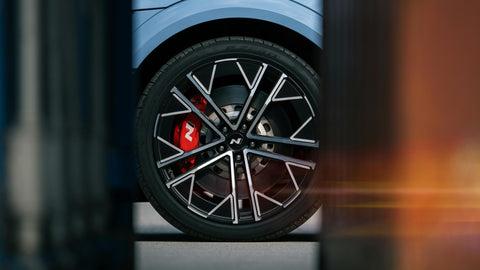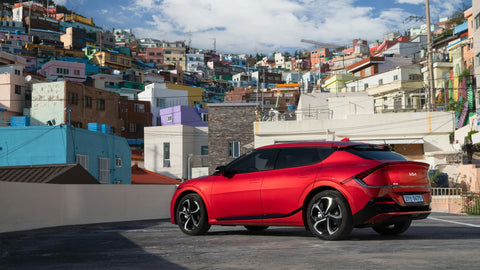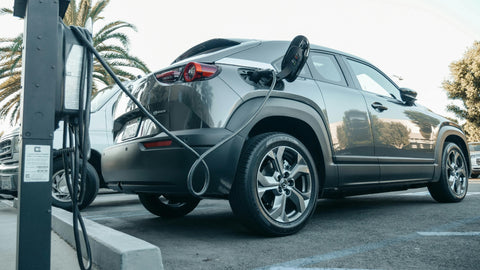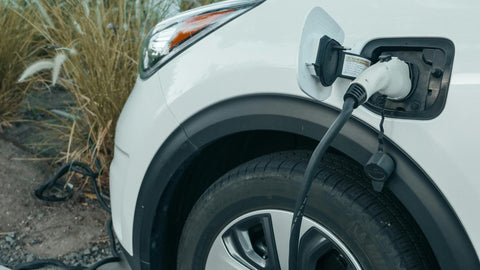A new trend in the automotive industry, electric vehicles (EVs) are helping to shape a greener, more sustainable future. Several misconceptions and falsehoods about electric vehicles persist, nevertheless, and they are preventing their broad acceptance, despite their increasing popularity.
These days, it's hard to miss an electric vehicle (EV) as it whizzes past gas guzzlers, making no noise and producing no pollution at all. However, you green warriors must not rush. Here are a few typical EV myths that need dispelling before you go headfirst into the electric ride market. This article will investigate and dispel some of these misconceptions about electric vehicles in an effort to clarify the facts.
Electric cars are not as safe as traditional vehicles
Electric cars are often thought to be unsafe. Electric car technology's novelty often causes this view. We'll refute this fallacy and highlight electric car safety features in this brief exploration.

In contrast to the perception that electric cars lack safety features, many models have solid chassis that ensure great crashworthiness. Reinforced chassis and battery placement strengthen the structure.
Compared to ordinary cars, electric cars have a lower center of gravity due to the placement of large batteries beneath the vehicle. This design improves stability and reduces rollovers, improving safety.
Contemporary electric automobiles feature sophisticated driver assistance systems (ADAS), such as collision avoidance and automatic emergency braking. These devices help drivers prevent accidents and improve road safety.
Electric car manufacturers focus battery safety measures on battery packs. Overheating and damage to lithium-ion batteries are prevented by advanced cooling and protection systems. The system also isolates and contains battery faults to reduce the risk of fire in rare accidents.
Compliance with Safety Standards: Electric automobiles undergo thorough testing to meet regulatory standards for traditional vehicles. Electric vehicles meet or exceed safety standards, giving users a reliable and safe form of transportation.
EVs are as slow as golf carts
They're nothing more than slow-spirited golf carts. Drags on and on? These speed devils aren't for me! When compared to their gas-powered competitors, electric vehicles blow the gas-powered ones out of the water with their quick torque. Get ready for an exhilaratingly quiet ride devoid of exhaust fumes and engine noise. Instead of missing the slow days of commuting, you'll be finding new excitement in driving.
EVs don't have enough range. Anxiety with a Limited Scope:
Many people have the wrong idea about electric vehicles because they are afraid of their restricted range, which is called "range anxiety." Electric vehicles are criticized for not having enough mileage to go lengthy distances. The range of electric vehicles, however, has expanded greatly due to developments in battery technology; several models can now travel distances that are on par with those of conventional gas-powered cars.

Electric vehicles can only go so far on a treadmill. Old EVs may have suffered from short-range anxiety, but modern ones don't! These days' electric vehicles can easily handle long road trips and regular commutes because of their enormous ranges. Miles, not hamster wheels, should be your thinking. Long trips are already less of a hassle, and rapid charging networks are springing up like mushrooms after a rainstorm. Electric vehicle owners also benefit from a growing network of charging stations, which makes lengthy trips more manageable.
EVs are more expensive than gasoline cars
You'll have to break the bank (or perhaps your kidney) to get them. To be fair, electric vehicles' initial investment may be more than that of gas-powered vehicles. The difference, however, is rapidly closing due to reduced maintenance costs, government incentives, and fuel savings. Plus, think about the big picture: electric vehicles have a higher resale value, and every time you fill up (or don't fill up) your tank, you save money on power.

The electricity used to charge EVs is created by burning fossil fuels, so there are still emissions involved
Electric vehicles produce far less pollution than their internal combustion engine counterparts, even if the power grid does use fossil fuels. The environmental impact of charging electric vehicles is going down as the power system becomes more reliant on renewable energy sources.
The power grid won't be able to handle the hundreds of thousands of EVs expected down the road
While electric vehicle demand continues to rise, grid infrastructure is adapting to keep up. An easier shift to an electric future is on the horizon, thanks to smart grid advancements and more investment in charging infrastructure, which are resolving worries about grid capacity for electric vehicle batteries.
Electric vehicles are not practical for long trips
The charging infrastructure is quickly growing, and the ranges of modern EVs are impressive. Because fast-charging stations cut down on the time needed for rest stops EV charging up while driving, long-distance travel is getting more and more viable.

Driving an EV won't save money in operating costs, based on today's gas prices
Electric vehicles may have a greater initial investment, but they often have a lower total cost of ownership owing to decreased maintenance and fuel costs. It is anticipated that the cost differential of all-electric vehicles will continue to reduce as technology progresses and economies of scale come into play.
EVs are unsafe
Manufacturers of EVs put a premium on safety in their designs and conduct extensive testing to ensure their vehicles are safe to drive. There have been instances where EVs have shown a reduced likelihood of fires compared to more conventional vehicles. There is a lack of comprehensive safety evidence that supports the idea that EVs are risky.
Charging an electric car is inconvenient and slow
However, both the electric vehicle charging and infrastructure and fast-charging technologies are witnessing tremendous growth. Public charging stations have become more convenient, and many of them offer high-speed charging choices, thus a lot of EV owners charge their cars overnight at home.
Electric cars are costly to maintain and repair
Compared to conventional automobiles, EVs often have fewer moving components, which means they tend to have cheaper maintenance expenses. Furthermore, it is anticipated that the cost of replacement parts will be driven down by economies of scale as the EV battery industry increases.
EVs are slower than petrol and diesel cars
The common belief is that electric vehicles (EVs) aren't as fast as gas and diesel-powered vehicles. However, EVs' immediate torque makes them incredibly quick to accelerate. It is no longer true that EVs are intrinsically slower; in fact, many high-performance EVs can match or even outperform conventional sports vehicles in terms of acceleration.
There's not enough renewable energy to support widespread EV use
Many nations are pouring resources into renewable energy as they strive to meet the worldwide goal of becoming energy-independent. There will be even more environmental benefits to EVs when the electricity grid gets greener.
Exorbitant Buying Prices:
The widespread belief that electric automobiles are out of reach due to their astronomical prices is another urban legend. Although some electric vehicles may have a higher sticker price than more conventional options, it's important to factor in the overall cost of ownership before making a final decision on most electric vehicle charging alone. Electric vehicles are often more cost-effective in the long term due to reduced maintenance needs, cheaper fuel prices, and government subsidies.
Inadequate Charging Facilities:
A widespread misunderstanding holds that electric vehicles are not feasible due to a shortage of charging infrastructure. Indeed, charging networks are receiving substantial investment from governments, businesses, and organizations around the world, and this expansion EV charging stations is happening at a rapid pace. Electric vehicles are becoming more practical for everyday usage as issues with charging point accessibility are being addressed through the development of public charging stations, home charging solutions, and new technologies such as fast charging.

It's a real pain to charge them. Although plugging a gasoline car in does require more time than a fast stop at the petrol station, the benefits become apparent once you do so. Having a fully charged battery waiting for you when you wake up from a night of charging in your pajamas is a dream come true. Who among us doesn't love taking a coffee break while our car refuels? Plus, public charging stations are popping up all over the place.
How Making Batteries Affects the Environment:
The environmental costs of producing batteries for electric vehicles say its detractors, exceed any potential advantages of pollution-free transportation. Research shows, however, that the environmental benefits of electric vehicles' reduced emissions from driving considerably exceed the costs of producing their batteries in the long run. Electric vehicles' negative impact on the environment is being further reduced by innovations in battery recycling technology.
Inadequate Performance and Missing Ideas:
The general public has it wrong when they say electric vehicles are sluggish and uninspired. The rapid torque delivery of electric motors allows many electric vehicles to boast remarkable acceleration and top speeds. To further disprove the idea that EVs lack the same level of innovation or excitement as conventional cars, car companies are pouring resources into R&D to improve EV performance and features.
Conclusion:
It is critical to debunk myths and correct misconceptions in order to encourage the wider use of electric vehicles, which are becoming more and more embedded in the automotive scene. In truth, electric vehicles have made great strides in performance, price, environmental effect, charging infrastructure, and range. We can all profit from electric vehicles and help create a cleaner, more sustainable road future if we can just separate reality from fantasy. We need to stop believing the myths and start believing in the electric vehicle technology's incredible potential.
EV batteries play a pivotal role in achieving zero tailpipe emissions, showcasing the transformative power of electric vehicle technology over traditional internal combustion engines. Get on board with the electric revolution and forget the misconceptions! A cleaner, quieter, and more sustainable future is within reach with the advent of electric vehicles, which are more than simply fashionable conveyances. Keep in mind that EVs are becoming more affordable and desirable as technology advances year after year.
 :
:  :
: 
















